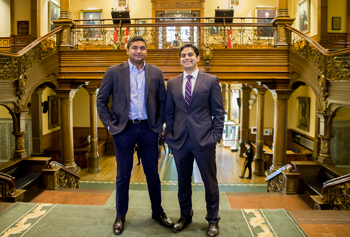Original author: Kelly O’Brien
Published: January 4, 2018
Source: stmichaelshospital.com
A team led by two physicians from St. Michael’s Hospital hope to use the vast quantities of routine clinical data collected in hospitals to improve patient care.

“Internal medicine patients are a large and growing population that reflects the changes in the population of Canada, as average age and the number of co-morbidities increase,” said Dr. Fahad Razak, an internal medicine physician.
“This is a large and complex population that consumes a lot of resources. If you can improve care for these patients, you can improve care for a lot of people, and make the system more sustainable.”
To improve those health outcomes, Dr. Razak, along with Dr. Amol Verma, another internal medicine physician, started GEMINI, or the General Medicine Inpatient Initiative.
GEMINI is a physician-led and data-driven quality improvement network for general medicine hospital patients across Ontario. The project is aimed at collecting, standardizing and analyzing internal medicine patient data at the individual, hospital and system-wide levels.
Seven hospital sites at five organizations in the GTA are participating in GEMINI. Over the next three years the team plans to develop a network of 30 academic and community hospitals across Ontario to participate in GEMINI and use data to support quality improvement.
The team has collected, standardized and analyzed data from all internal medicine hospitalizations at the seven participating hospitals from 2010 to 2015, covering 140,000 visits and approximately 80,000 patients. All data is anonymized in accordance with provincial privacy laws.
Physicians and clinical care teams will be able to access data within their organization and hospitals will be able to use the data to inform efforts to improve care across the health-care system.
Did you know?
General medicine inpatients account for about 40 per cent of hospital admissions from the Emergency Department and occupy 25 per cent of all hospital beds
“We’re providing data back to doctors for the first time using a province-wide standardized format,” Dr. Razak said. “They will have access to a quality compass which includes important measures related to patient outcomes or use of hospital resources.”
GEMINI will also open the lines of communication so doctors and care teams from different divisions and hospitals can learn from each other said Dr. Verma.
“Our focus is about sharing this data so that front-line care providers can be informed about how they’re delivering care and engage in a community of practice across the province that focuses on a data-driven approach to improving quality,” he said.
The data will also have enormous research potential, said Dr. Razak.
“Before we started this project, we realized that the patients we’re seeing—aging patients with multiple chronic diseases—weren’t reflected in the medical literature,” he said. “Through GEMINI, we’ve created an infrastructure to share clinical data and study how to continuously improve care for our patient population.”
About St. Michael’s Hospital
St. Michael’s Hospital provides compassionate care to all who enter its doors. The hospital also provides outstanding medical education to future health care professionals in more than 29 academic disciplines. Critical care and trauma, heart disease, neurosurgery, diabetes, cancer care, care of the homeless and global health are among the Hospital’s recognized areas of expertise. Through the Keenan Research Centre and the Li Ka Shing International Healthcare Education Centre, which make up the Li Ka Shing Knowledge Institute, research and education at St. Michael’s Hospital are recognized and make an impact around the world. Founded in 1892, the hospital is fully affiliated with the University of Toronto.
